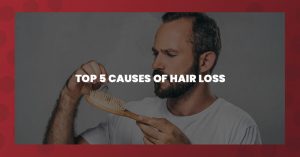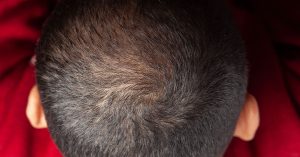Many factors can affect the health of your hair – including genetics, nutrition, aging, and stress levels, among others. The most important factor though is the health of your body. When you become ill or develop a chronic condition, you may experience a disruption in your hair’s usual growth cycle.
Many illnesses result in excessive hair shedding, which differs from permanent hair loss. Illness interferes with your hair’s regular growth cycle, causing more hairs than usual to enter the telogen effluvium [shedding] phase.
Even something as common as the flu can stress your body and wreak havoc on your hair. Fevers, viruses, infections, and other health stressors can force hair into this protracted shedding phase – up to two to three months after the illness has cleared. Severe and chronic illnesses can cause long-term hair loss, continued shedding, or slow regrowth.
What Illnesses Cause Hair Loss?
Some of the illnesses commonly associated with hair loss are:
- Alopecia Areata: This autoimmune disease causes the body to attack the hair follicles, resulting in patchy hair loss. Alopecia Totalis is the condition that results when alopecia areata progresses to complete baldness.
- Anemia: Although the causal link is still being investigated, there is evidence that iron deficiency is often present in those who experience hair loss or excessive shedding.
- Cancer: Certain types of cancer (such as Hodgkin’s lymphoma) directly cause hair loss. Other types of cancer result in hair loss due to chemotherapy treatments.
- COVID-19: Covid can result in excess hair shedding and delayed growth of lost hair, especially when the infected individual experiences a high fever.
- Lupus and other autoimmune disorders: Lupus causes brittle, easily broken hair, and patchy hair loss. Some forms of Lupus cause scarring of the scalp, which results in further hair loss.
- Myotonic dystrophy: This rare, progressive disorder usually begins in young adulthood. One symptom is frontal alopecia, presenting as baldness at the front of the scalp.
- Pituitary diseases: Pituitary dysfunction results in hormonal imbalances, which lead to changes in hair growth patterns and hair loss. Other hormonal conditions, such as PCOS, also cause hair loss.
- Sarcoidosis: This inflammatory condition causes swelling and scar tissue throughout the body, including the scalp.
- Skin conditions: Skin conditions like psoriasis or seborrheic dermatitis also cause inflammation and scarring on the scalp.
- Thyroid issues: Having an overactive or underactive thyroid can lead to hair loss.
- Trichotillomania: This disorder causes an irresistible urge to pull out healthy hairs on the head or other areas of the body, resulting in bald patches.
Is Hair Loss Caused by Illness Permanent?
The good news is that many types of illness-related hair shedding are temporary. It can take as long as six to nine months for the excess shedding to stop, but after that your hair growth cycle should return to normal.
If you have a disease or condition requiring long-term medication, you may experience drug-related hair shedding. Beta-blockers, statins, blood thinners, antidepressants, hormone-replacement drugs, and non-steroidal anti-inflammatories (NSAIDs) are some of the drugs that can cause chronic telogen effluvium. Luckily, there are treatments available to help counteract these effects.
The Hair Center of Nebraska Can Help With Hair Loss
If you have been diagnosed with an illness or prescribed a medication that is known to contribute to hair loss, contact The Hair Center of Nebraska for a consultation. We offer treatments that may help preserve existing hair, regrow shedding hair, or address permanent hair loss. We will do an evaluation to determine the treatment plan that is best for you. By setting up a consultation, you are taking the first step on your journey to a better life and a fuller head of hair. Contact us today to set up an appointment.






